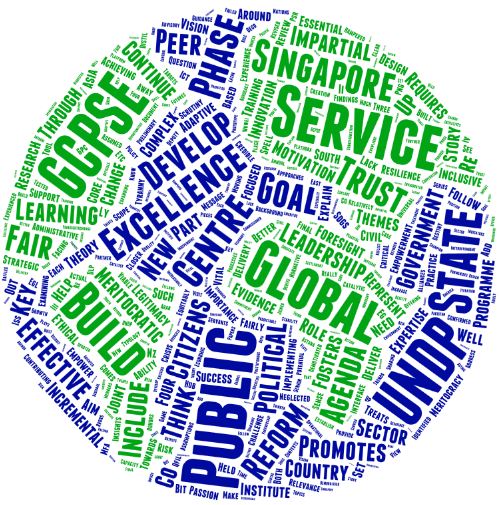
The ‘Now’ and Future of Effective Institutions for Public Service
At the Effective Institutions Platform (EIP), we focus making public service more effective in fast changing environments around the world. Profound social, economic, political and technological trends are re-shaping ways in which governments think and act, and the contexts they operate in.
In parts of the global North, rising demand and financial constraints are driving a mix of austerity, innovation and the need to do more with less. In rapidly-growing parts of the global South, governments are responding to increasing populations and rising citizen expectations by building innovative service infrastructure that exploit new technologies to ‘leapfrog’ traditional service models. For parts of sub-Saharan Africa and South East Asia, the politics of high debt and ‘Washington Consensus’ adjustment are evolving into new initiatives focused on institution-building, integrity and adaptive governance.
Each of these trends implies a different concept of ‘effective institutions.’ It also means a different relationship between citizen/taxpayer and the state, including between politicians, the public, civil service (meaning central ministries and sub-national equivalents), public services, and the people responsible for delivering them.
During the first phase of work (2012-15) at the UNDP Singapore Global Centre for Public Service Excellence, we identified four relatively neglected but critical themes for development – motivation, leadership, foresight and innovation in public services.
Our research in Phase 1 also confirmed that public service is key to development. Yet how or why an impartial, ethical, fair and meritocratic public service comes about and how it can be promoted and fostered remains perhaps the biggest puzzle holding up international development, now articulated in the Sustainable Development Goals (SDGs) agreed by the UN General Assembly in September 2015.
Now in the second phase of the Centre, we aim to pursue this and make a tangible difference by helping UNDP and our partner countries in:
1. Building citizens’ trust in public service as fair and impartial.
2. Fostering better appreciation of the key roles that the public service plays in every developing country for achieving development.
3. Acting as a source for new thinking and action on public service excellence,
4. Supporting Networks for effective reform, stronger evidence, and South-South collaboration.
5. Focusing on our four Phase 1 themes, to support public service in developing countries –
i. public service motivation, by fostering ‘New Public Passion’, or a sense of calling;
ii. visionary leadership through an effective political-administrative interface;
iii. strategic foresight, by focusing on its importance for empowerment and resilience; and
iv. innovation, focused on strengthening trust.
6. Questioning assumptions where the evidence suggests there is a case for re-examining development practice; and
7. Contributing to global research priorities on improving public service.
We can also derive broad questions about effective institutions:
How can public service best create space for innovation and change, using new technology and addressing citizen expectations, that challenge traditional preconceptions of bureaucracy?
- How do effective institutions embrace public management as an adaptive or complex science – especially for public servants working within disempowering or even corrupting constraints?
- How do integrity and a strong values base to public service excellence – i.e. public service that is impartial, based on ability, and promotes continuous learning and incremental change – really be institutionalised?
The challenges facing effective public institutions include:
- To what extent do public servants have the capabilities that equip them for different ways of working that are emerging? Are governments doing enough to build professional expertise, underpinned by regulatory and policy-making competence, that creates motivating careers in public service?
- Do reformers simply want to rush into “effective” technocratic solutions, or do they recognise the importance of trust, legitimacy and fairness by public service explicitly upholding public good and the interests of future generations?
- How, in turn, can these underlying principles inspire future reform strategies - where cautious incrementalism and ‘learning by doing', is much more likely to succeed than ‘big bang’ reform?
- And, whilst New Public Management (NPM) and other more traditional thinking on bureaucracy are clearly well past their usefulness, where is new conceptualisation of effective institutions going to come from?
Why these issues are worth raising?
We know that the SDGs spell out a set of universal Global Goals that represent the complexity of the development agenda. What, however, the final document (2030 Agenda) does not provide insights into how the Goals will in practice be delivered. The vital role of the public service is simply assumed away.
Yet three preliminary findings from Phase 1 indicate that:
- Development is hampered by the lack of a credible theory of change to explain how or why an “impartial, ethical, fair and meritocratic public service” comes about and how it can be promoted and fostered;
- That excellence is embodied by an “impartial, ethical, fair and meritocratic public service”. It also explains citizens’ trust in government, which is essential for development and legitimacy, and how public service is experienced (co-creation) and actually delivered;
- The risk of a demoralised and demotivated public service (in both developing and developed countries) represents a potential crisis facing the implementation of the 2030 Agenda.
I believe that the EIP approach to peer to peer learning can provide an invaluable way to come up with some useful answers.
So my core message is that we need a much better framework for public sector reform, built, I would suggest, around what I call A.I.M. (Adaptive Impartial Meritocratic) for Excellence, where public service is impartial (treats all equitably and fairly, essential for building citizens’ trust in government); based on ability; and promotes continuous learning and incremental change.